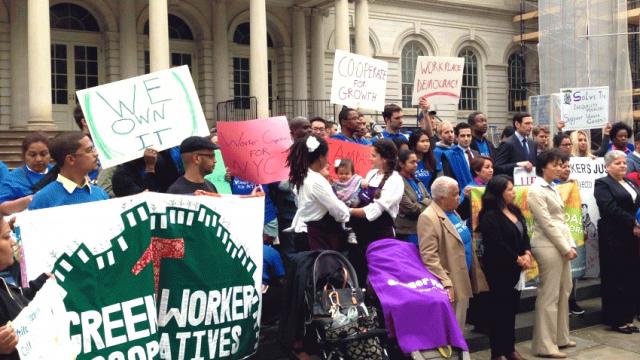
In a victory for new economy advocates, the New York City Council recently passed a budget that will create a $1.2 million fund for the growth of worker-owned cooperative businesses. The investment is the largest a municipal government in the U.S. has ever made in the sector, breaking new ground for the cooperative development movement.
Melissa Hoover, executive director of the U.S. Federation of Worker Cooperatives and the Democracy at Work Institute, hails the New York City Council’s move as “historic.” “We have seen bits and pieces here and there, but New York City is the first place to make an investment at that level,” she says.
New York’s cooperative development fund was the brainchild of a coalition of community groups—including the Federation of Protestant Welfare Agencies, the New York City Network of Worker Cooperatives, the Democracy at Work Institute, Make the Road New York and others—that came together to stage a series of public forums and advocacy days to secure widespread support for the initiative on the City Council. Over the next year, the fund will provide financial and technical assistance in the planned launch of 28 new cooperatives and the continued growth of 20 existing cooperatives, supporting the creation of 234 jobs in total.
While this may just be a drop in the bucket when it comes to the city’s $75 billion total budget, cooperative advocates are hoping New York’s example can help turn the tide in favor of alternative strategies for urban development.
“We’d like to get to a tipping point where [cooperatives] really have a measurable impact on the local economy,” says Hilary Abell, a San Francisco-based co-op development consultant who co-founded the group Project Equity. She notes that while interest in cooperatives has surged, there are still fewer than 5,000 “worker-owners” nationwide. Nevertheless, the model of worker-owned cooperatives has captured the imaginations of many low-income communities of color hit hardest by the Great Recession, she says, creating “a window of opportunity to take this to the next level.”
Last month, Abell released a report called “Worker Cooperatives: Pathways to Scale,” which outlines a set of strategies to grow the cooperative movement nationwide. While there are several promising federal policy initiatives underway—Senator Bernie Sanders (I-Vt.), for example, has introduced a bill that would create an Office of Employee Ownership and Participation within the U.S. Department of Labor, as well as another that would establish a U.S. Employee Ownership Bank—Abell believes that “advocacy for cooperatives may have the greatest momentum at the state and municipal levels.”
Across the country, similar local economic justice coalitions have been seeking to persuade municipal governments and local institutions to throw their resources behind the development of worker-owned co-ops. It’s those resources, many advocates believe, that could take co-ops from a niche movement to a broad-based strategy for creating living-wage jobs and putting economic power in the hands of workers.
To that end, Abell hopes to see more cities follow in New York’s footsteps. In the Bay Area, she tells Working In These Times, local organizers are currently reaching out to local officials for support in scaling up worker-owned cooperatives to the point that they constitute five to 10 percent of the local economy. The coalition is particularly focused on creating jobs for workers of color in the low-income areas of the East Bay, as past experiences have shown that worker-owned co-ops can be particularly effective in redressing racial inequities in the job market. For example, Women’s Action to Gain Economic Security (WAGES), a network of nearly 100 worker-owned cleaning cooperatives in Oakland, has increased members’ incomes by more than 50 percent.
Other hotbeds of co-op development include Richmond, California, where the city has hired its own cooperative developer and is launching a loan fund under the leadership of Green Party Mayor Gayle McLaughlin. In Cleveland, Ohio, the city’s economic development department has worked closely with the Evergreen Cooperatives, a network of worker-owned green cleaning, farming and construction businesses; local hospitals and universities have also thrown their purchasing power behind worker-owned businesses. And as In These Times has reported previously, several unions have made a foray into the co-op business, combining place-based growth with a focus on leveraging changes across industries such as homecare.
Instead of simply appealing to local leaders for support, some activists have sought to build both political and economic power by building electoral campaigns around the issue of cooperative development. No city had secured greater local support for co-ops than Jackson, Miss., a majority African-American municipality where human rights attorney and longtime black radical activist Chokwe Lumumba was elected mayor last year on a platform that included the use of public spending to promote cooperative enterprises. But following Lumumba’s sudden death in February, the movement that brought him to office has been left struggling to implement the vision it had forged.
Local activists say new Mayor Tony Yarber has been tepid in his support for the cooperative development plan developed by Lumumba’s administration, leaving them uncertain as to whether they can count, for example, on city contracts being awarded to local worker-owned businesses. According to Brandon King, a member of the group Cooperation Jackson who also worked on the Lumumba campaign, access to such contracts would have been a huge boon for nascent construction and waste-management cooperatives, as Lumumba’s campaign had estimated that the city would need to spend $1.2 billion over the next 10 to 15 years on infrastructural upgrades and repairs. What often happens, says king, is that contracts go to companies located in wealthier and majority-white suburbs outside of Jackson, with the result that “people in Jackson aren’t really engaged in building their own city.”
Despite the change of course in city government, king says Cooperation Jackson “is still working on building co-ops that are large-scale, and getting as many people engaged in economic democracy as possible.” The movement has a history of black community participation in cooperative enterprises to draw from, king notes. Meanwhile, adds Cooperation Jackson member Iya'Falola Omobola, while the group works to get childcare and urban farming cooperatives off the ground, with or without city support, “We’re going to be ready to mobilize around an appropriate candidate in the next [mayoral] election.”
Noting the particular conditions that have helped secure local support for cooperatives in New York City and Jackson, the Democracy at Work Institute’s Hoover acknowledges that activists are still exploring how these can be replicated elsewhere. But if these cities are successful in retaining long-term support for cooperative growth, they can serve as a jumping-off point for other areas. “Our hope is that these won’t be one-off examples,” Hoover says. “What we need ultimately is a shift among those doing local development: from, ‘Quick, let’s get a Home Depot to come in and create jobs, but they’re low-wage and low-skilled,’ to a deeper and more patient strategy. These places could really start that shift.”
3 WAYS TO SHOW YOUR SUPPORT
- Log in to post comments














